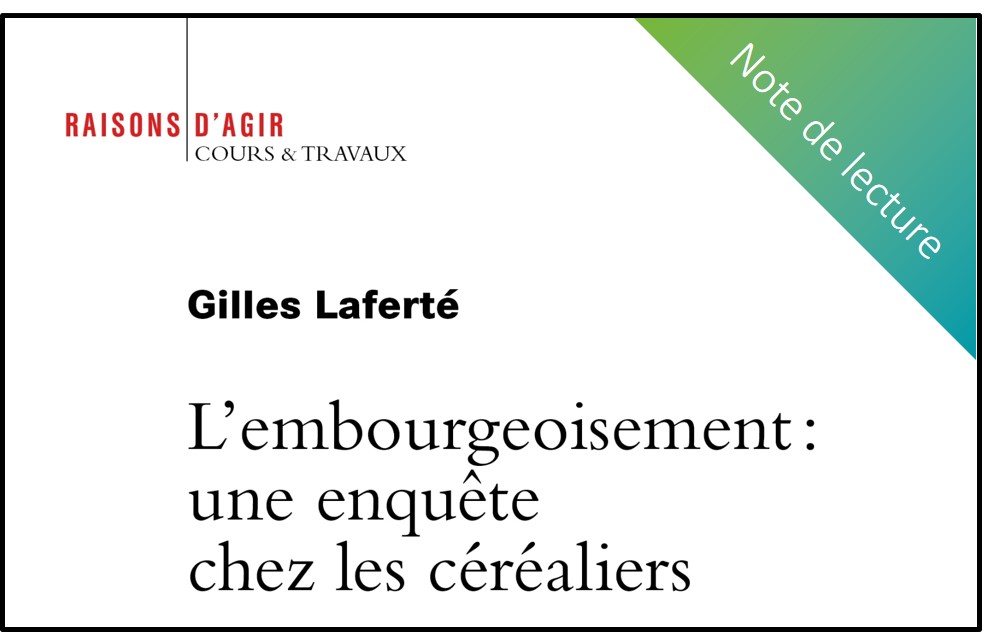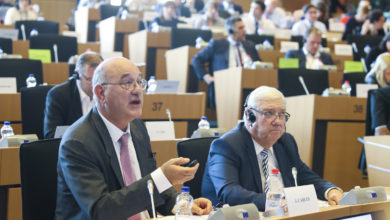
Download the PDF
This reading note was written for publication in the journal Paysans et Sociétés. It relates to the work “L’embourgeoisement: une enquête chez les céréaliers” by Mr. Gilles Laferté, sociologist at INRA, published by RAISONS D’AGIR
The title of this book will sound to some as provocative, to others as obvious. For the former, the use of the defined plural article will appeal to the € 19,153 in current income before tax on average in 2017 by cereal producers, 65% of which would fall into negative balance without subsidies. Among the latter, the a priori as to “large grain farmers who are fattening the CAP” are sufficiently admitted that the reality of the figures is no longer worth considering.
Placing ourselves in the first category, we nevertheless found an interest in reading this work which turns out to be very critical of a certain French sociological tradition in agricultural and rural matters. In addition, the important work of investigations provides quite precise elements although they do not seem to have been completely integrated into the reflection, which proves prejudicial as it could have made it possible to go beyond the initial hypotheses of the ‘author. This work indeed begins in full parenthesis of the years 2007-2012, period when cereal prices reached peaks, breaking with the low levels observed before (from the reform of the CAP from 1992 to 2006), but also since 2013.
Unlike the statistician, the sociologist is not bound by the question of the representativeness of the individuals whom he observes more particularly. However, we would have appreciated some elements on the selection criteria which led to the in-depth study of the half-dozen families presented as having the largest areas, in this territory in the superficial lands of the borders of Burgundy and Champagne .
The choice which presided over the historical trajectory of these families since their settlement between the end of the 19th century and the middle of the 20th century seems to be understood by the critical look that the author has on French rural sociology. First, he criticizes him for giving a “fixist and autarkic” image of agriculture before the modernization period. Provided with initial capital from the sale of their land in wealthier regions (Alsace, Lorraine, Belgium), these families were then able to lease and then buy farms, in a region where the structures were already large. , at different periods when the notable owners of that time disengaged their patrimony from agricultural activity.
A slogan aimed at the emancipation of stepdaughters
In addition, the author criticizes French rural sociology for having built a kind of “miserability” by focusing on the social non-reproduction of certain forms of agriculture. The families studied found themselves, in the middle of the 20th century, faced with the possibility of incorporating technical progress (seeds, fertilizers, pesticides) to increase their yields in a context of regulated agricultural markets and control of land rent. And, for those who have succeeded, they have indeed experienced a certain profitability from their agricultural activities and capital growth.
Finally, Gilles Laferté distances himself from the approach often encountered which consists in reducing family farming to the management of a farm by a couple and in considering that it was the most frequent mode of organization there has half a century half a century. In the light of this reductive frame of reference, the observation of a diversity of productive configurations leads to postulate the “breakdown of the family model” and feeds the thesis of its inevitable disappearance. It will be objected that behind the qualifier “two UTH (unit of human work)”, it is especially necessary to see a political slogan of the 1960s aimed at the emancipation of stepdaughters and that the proportion of wage earners in agriculture was clearly higher at the end of war only now.
So we share the author’s analysis when he writes: “if they are bosses, operators and co-operators, it is above all of themselves and their relatives (wives, brothers, sons)” (p .138) and “far from having died, yesterday’s family farming has changed to form the face of contemporary agricultural family capitalism” (p.132).
Where, on the other hand, we will be much more doubtful is when the sociologist speaks of a movement of “gentrification as structural for a long period” and of “guaranteed social reproduction”. On the one hand, he is not interested in the leavers who freed the land which allowed the expansion of the rest. On the other hand, he does not draw the main lesson from the information he has collected: these families live less from their agricultural activities than from non-agricultural activities which they have developed in the past (transport, stone quarry, trade, hunting in Africa).
In the words of one of the farmers interviewed, there is also a sufficiently explicit marker of the deterioration in the profitability of agricultural activities (p.185-186): when his grandfather had been able to buy all the land he worked , he considered himself unable to buy the land he exploited and he hoped that his brothers and sisters, his aunts and his neighbor would not have to sell them. However, the author will continue to speak of “monopolization of land by farmers” throughout the rest of the book.
In addition, if beyond the only heritage, the sociologist defines gentrification as “respect for the established social order”, we are surprised to see no mention of the feelings of farmers vis-à-vis the evolution of the CAP, even though they were questioned by representatives of public research! This blind spot questions.
Finally, to stay on a positive note as it is important that empirical approaches multiply even if only to request normative frameworks to be renewed, we can only encourage Gilles Laferté to develop, in his future work, this “ethos du faire ”which he identifies among the farmers studied and which he compares with that of other independent and artistic professions. Because, what one could call “the peasant ethos” will continue to be an object of study for sociologists who will want to go beyond Mendras and the end of the Peasants in order to make themselves useful to understand and perhaps help the agriculture and farmers meet the challenges of the 21st century.
Frédéric Courleux, Director of studies for Agriculture Strategies
Title : “L’embourgeoisement : une enquête chez les céréaliers”
Author : Gilles Laferté, sociologist at INRA
Editions RAISONS D’AGIR – Cours&Travaux, 363p., 2018












